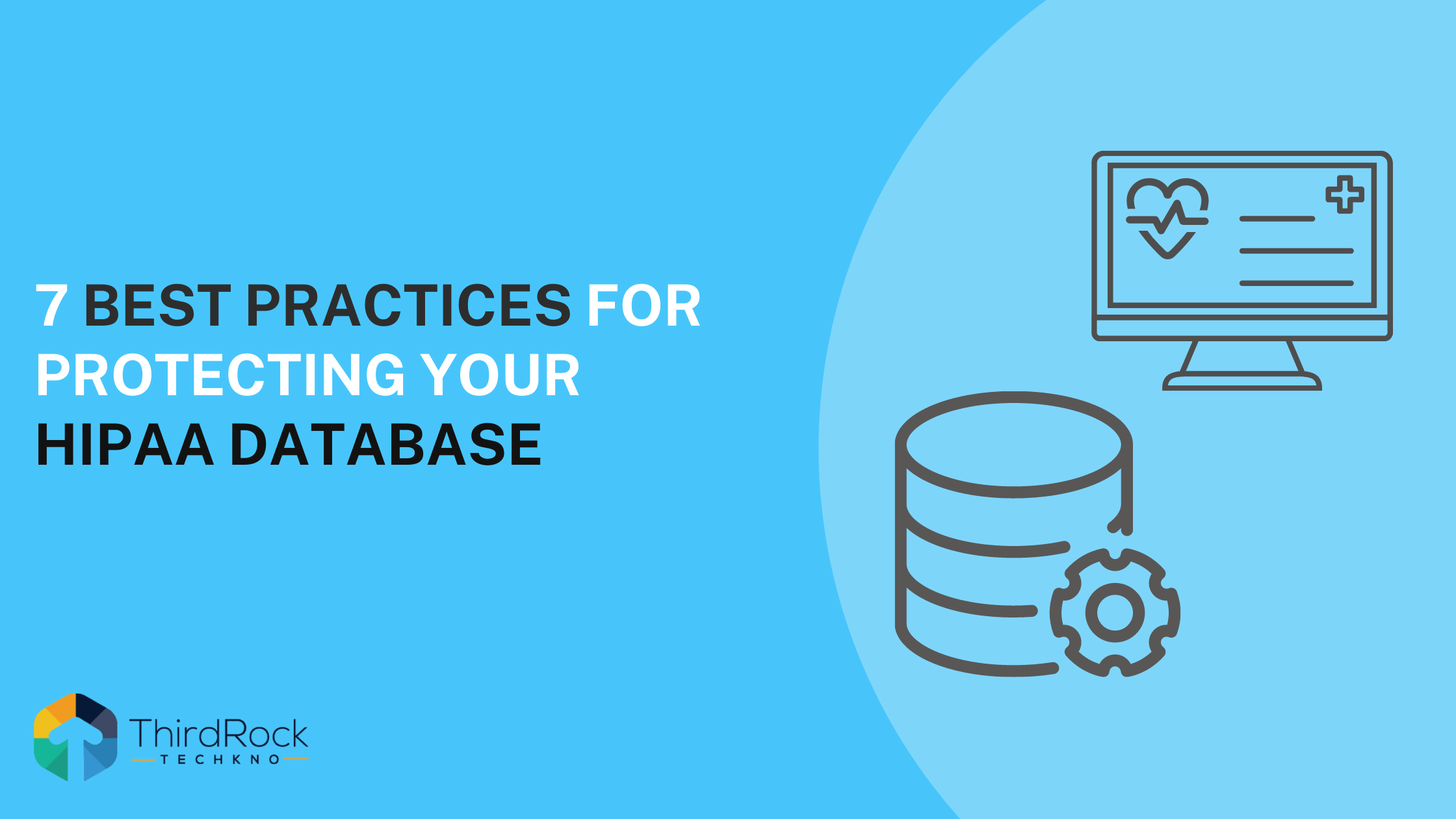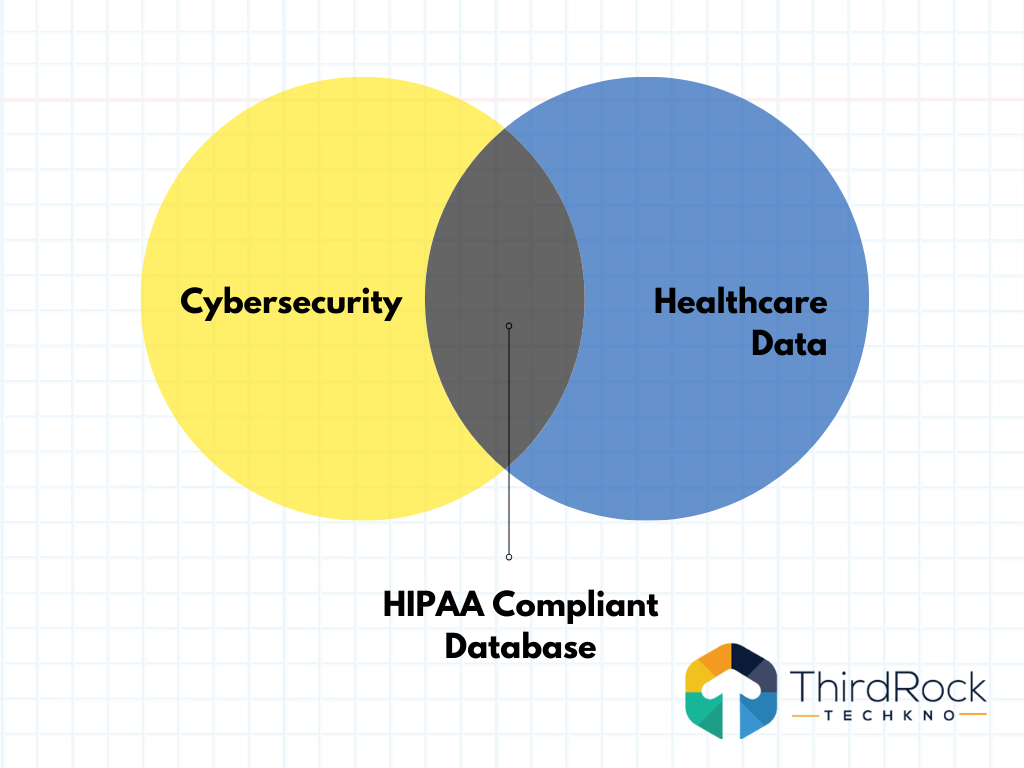
Table of Contents
Data is at the heart of every business. The importance of protecting and safeguarding confidential data cannot be overstressed. However, this becomes 10x intense when it comes to the healthcare industry. The regulations and compliance requirements demand strict adherence to data protection measures.
Today healthcare providers and their business associates are under a continuous radar to not only provide quality patient care but to also meet the requirements set forth by HIPAA while protecting patient privacy at all times.
Whether you are a healthcare provider or healthcare app developer, what is required is a robust healthcare data protection program that ensures necessary administrative, technical, and physical safeguards are implemented to maintain HIPAA compliance requirements. This is why it is crucial that all sensitive information be stored in a HIPAA compliant database.
Wondering what is a HIPAA database and what it means to be HIPPA compliant? Let us help you out! This guide will cover everything from the basics of HIPAA to the top 10 data protection best practices for implementing a HIPAA compliant database:
What is HIPPA?
HIPAA or the Health Insurance Portability and Accountability Act came into existence back in 1996. As a US regulation law, it states how organizations are required to manage and secure sensitive patient data and protected health information (PHI).
Healthcare providers and vendors such as health tech companies, insurance agents, care management staff, medical device companies, and all those organizations who collect, store and transmit PHI must stay compliant with all HIPPA safeguards in order to protect patient information.
HIPAA requires covered entities and their business associates to vouch for the safety of patient information and ensure that such data is only accessed by authorized personnel for authorized purposes. Non-compliance with HIPPA can come with hefty fines and penalties since PHI falls under the highest bracket of sensitive personal data that is continuously being fetched by criminals and hackers. Hence securing your HIPPA database is paramount.
What is a HIPPA Database?
Database is the destination or the source where PHI will be stored. HIPAA compliant database services provide healthcare organizations a digital data environment to manage their operations and keep patient data secure. Over the years cloud HIPAA hosting has become a suitable option for many healthcare providers because of how easy and affordable it is to scale cloud databases without the additional cost and challenges of upgrading on-premises hardware.
Despite cloud HIPPA hosting’s popularity, many still believe that data stored in the cloud is less secure than the on-premise data centers. This is absolutely untrue. In reality, shifting databases to the cloud strengthens security significantly. But what measures do these providers take? Today, HIPPA database hosting providers have become extremely vigilant. They not only create robust security controls but also make it a point to regularly test their defenses to ensure they offer maximum security against major cyberattacks in the industry.
Read More: Complete HIPAA Compliance Checklist For Software Development
Importance of Storing Data in a HIPAA Compliant Database

Amidst the pandemic shaken world, 2020 witnessed cyberattacks on healthcare data skyrocket. It’s no secret that healthcare providers accumulate an unprecedented volume of sensitive data, which is why healthcare organizations often take a larger hit since they possess so much high monetary and vulnerable information that these automatically become a big fish for cyber thieves.
Cyberattacks on healthcare more than doubled in 2020, with ransomware accounting for 28 percent of all attacks. (Source: IBM Security Report)
1,531,855 records were breached across 39 healthcare data breaches in February 2020 alone. (Source: HIPPA Journal)
It has been estimated that lost or stolen PHI may cost the US healthcare industry up to US$7 billion annually. (Source: JAMIA)
The targeted data includes patients' protected health information(PHI), financial information like bank account details and credit card numbers, personally identifying information (PII) such as name, personal address, social security numbers, and intellectual property (IP) related to medical research and innovation.
Data breaches, stolen credentials, leaked personal records are all examples of nightmares that occur due to mismanaged data. When your organization experiences a security breach, the potential fallout can be significant, affecting your reputation and patients’ trust. It can also lead to expensive class-action lawsuits by aggrieved customers as well as costly remediation costs.
A well-known example is the May 2017 “WannaCry” ransomware attack wherein patient outcomes were threatened when Britain’s National Health Service took a hit resulting in ambulances being diverted and surgeries being canceled. Thus, storing your information in a HIPAA database and ensuring you follow through HIPAA compliant database requirements is absolutely vital.
Read More: Healthcare Mobile Apps: Development, Features, Trends & Types
Tips for Protecting Your HIPAA Database
The fact that all health apps and storage formats are database-driven that store PHI within their tables shows exactly why having a HIPAA compliant database with increased safety and security is a pressing priority for all healthcare organizations and their covered entities.
This is also a mandatory requirement by the Health Information Technology for Economic and Clinical Health Act (HITECH) that stated the need for all healthcare providers to secure electronically protected health information (ePHI) including any cloud storage services and digital health apps must be compliant with HIPPA security guidelines.
Cloud vendors and health app developers must implement the HIPPA Security Rule that is inclusive of a very specific set of administrative, physical, and technical safeguards.
For a truly HIPAA compliant database, its best healthcare organizations follow these tips and practices to secure their HIPPA database:
Data Encryption is Key
Encryption is essential. All PHI whether in rest or transit must be encrypted. Encryption will convert your ePHi data into an encoded form that will only be visible to authorized personnel with the use of a decryption code or key. Encrypting information makes data unreadable that restricts corrupt third-parties hackers to access controls. Even if data gets stolen encryption will ensure the information is unusable.
Conduct risk assessments
One of the best ways to determine how secure or vulnerable an organization is through performing regular risk assessments. These can help identify a number of different vulnerabilities that are present in your organization’s data security. Areas at risk include lack of employee awareness, shortfalls in the security coverage of vendors, failure to set up authentication access, and so on.
Just as prevention is better than a cure, the best way to avoid bearing the brunt of data breaches is through regular risk assessments in order to keep the HIPAA database secure.
Training is integral
78 percent of healthcare employees lack preparedness with common data privacy and security threat scenarios. This just proves the need for ramping up efforts when it comes to training and education amongst healthcare workers. Security awareness equips arms your staff with the right tools to identify possible phishing attacks and the importance of following security best practices when handling sensitive HIPAA databases. Training your staff also enables them to exercise caution when dealing with patient data.
Restrict access controls
A database storing protected health information (PHI) must have necessary access controls in place. The greater the number of people who have access to your data, the more exposed and at-risk you remain for a data breach. Limiting access to sensitive patient details in your medical applications and data is critical to protecting your database. Leveraging user authentication can help ensure that all users who look at the data have been authorized.
Set up audit logs
Audit logs stop the effects of malicious activities that threaten the safety of the healthcare database by flagging issues in real-time. As per the HIPAA compliant database regulations, all healthcare organizations must create an audit trail to keep track of all the user logins, reads, writes, queries, edits, and access to PHI in a separate log sheet to detect possible threats.
Plan for data disposal
There must be plans in place to securely erase your database and dispose of the data and media in your system that are no longer needed. The longer you hold on to data, the stricter the regulations become. According to current NIST standards, high-security file wiping is an absolute requirement when devising a plan for data disposal.
Enforce Business Associates’ Agreement (BAA)
Healthcare providers must take a signed business associates’ agreement (BAA) from their public cloud provider. As per the law, it is also compulsory for your cloud storage service to provide you with a business associate agreement (BAA) stating that they’re HIPAA compliant
The BAA defines the security responsibilities between cloud HIPAA hosting providers and cloud customers.
Read More: Step-by-Step Guide to HIPAA Compliant App Development
Top 6 HIPAA Compliant Cloud Database Storages for You
Are you thinking of purchasing a HIPAA compliant cloud database? Have a look at your options.

Wrapping Up
HIPAA is by far the most important regulation when it comes to protecting your patients’ privacy. It can be a scary thought to think of your HIPAA database being breached and your protected health information being exposed. But, it doesn’t have to be. By taking the time to set up your database correctly, you can greatly reduce your risk of a breach.
Ensuring your app is HIPAA compliant is definitely not an easy feat and can be quite challenging, to say the least. This is where the help of an expert could come to your aid. We truly believe in the fact that healthcare apps are perhaps the most critical ones and building those requires an empathetic approach. Our healthcare apps developers are seasoned players of the industry who can help you with custom software development for healthcare.
Get in touch with us today.
More On Compliance & Regulations


